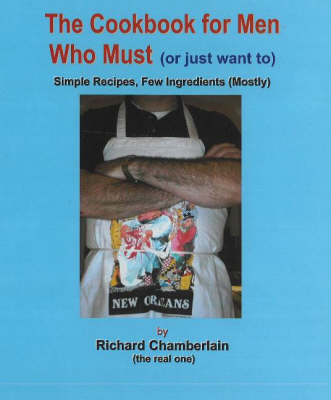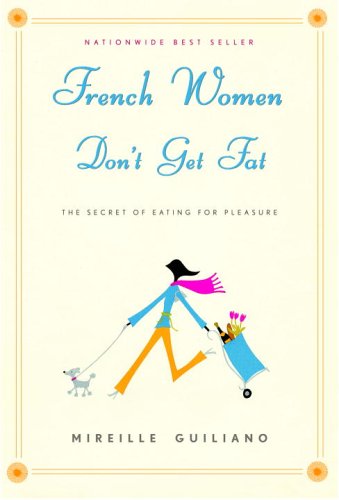Girl trouble
April 30, 2012 by SusieWe had no idea what we were getting into when the blog post on recipes that fail went up last week. What spawned the controversy was a single phrase I put in at the end of the piece: “the home cook will blame herself [for the failures of the recipe].”
It was then that one reader on a cookbook forum fixed upon that single word, “herself,” and went Yosemite Sam on us. How could I imply that all home cooks were women?! Suddenly I was a 1950’s throwback (kind of funny, since I was born much later) and sexist to boot (not so funny).
Truthfully, I hadn’t bothered to gender-neutralize the pronoun precisely because I felt we were all long past thinking only women cooked. After all, most of my guy friends cook.
 Yet it brought me back to a subject I’ve considered before: the very
effective marketing of cookbooks by gender. Even in these
enlightened times, publishers still feel obliged to offer a
defensive perimeter to men who like the kitchen: e.g., The Cookbook for Men Who Must (Or Just Want
to). Or cater to the “manliest” cooking jobs – The
Man’s Book of the BBQ, or give a guy a ulterior motives:
How to Be Her Kitchen Love God. Never
forget, they seem to say, that Tough
Guys Don’t Dice.
Yet it brought me back to a subject I’ve considered before: the very
effective marketing of cookbooks by gender. Even in these
enlightened times, publishers still feel obliged to offer a
defensive perimeter to men who like the kitchen: e.g., The Cookbook for Men Who Must (Or Just Want
to). Or cater to the “manliest” cooking jobs – The
Man’s Book of the BBQ, or give a guy a ulterior motives:
How to Be Her Kitchen Love God. Never
forget, they seem to say, that Tough
Guys Don’t Dice.
 Cookbooks marketed towards
women, oddly enough, don’t actually tend to use the word “woman”
(excepting Ree Drummond, the Pioneer Woman, and her romantic frontier empire). Usually,
there’s a bit of a upgrade from plain old womanhood: “Domestic
Goddess,” “Barefoot Contessa,” “Lady and Sons”. Today, the
word of the moment is “girl”, as in: Gluten-free Girl & the Chef, A Girl
and Her Pig, One Girl
Cookies. “Girl,” it seems, has become a term of empowerment
somehow–an indication, if you needed one, that the 50’s are far
behind us. We’re definitely not in Stepford anymore,
Toto.
Cookbooks marketed towards
women, oddly enough, don’t actually tend to use the word “woman”
(excepting Ree Drummond, the Pioneer Woman, and her romantic frontier empire). Usually,
there’s a bit of a upgrade from plain old womanhood: “Domestic
Goddess,” “Barefoot Contessa,” “Lady and Sons”. Today, the
word of the moment is “girl”, as in: Gluten-free Girl & the Chef, A Girl
and Her Pig, One Girl
Cookies. “Girl,” it seems, has become a term of empowerment
somehow–an indication, if you needed one, that the 50’s are far
behind us. We’re definitely not in Stepford anymore,
Toto.
Once in a while in my twenties I used to feel twinges of feminist rage in the kitchen, but time and a highly egalitarian marriage erased those feelings. My guy friends, equally, seem totally at ease baking their foccacia, roasting their pork loins, ordering their truffle salt. While some publishers might fear men feel threatened by being in the kitchen, and our excitable friend might fear someone’s being insulted when we acknowledge women are “home cooks,” my guy friends just shrug and get on with their braising. It’s not an issue for them, and it’s not an issue for us, their women friends, spouses, and colleagues.
So much for the battle of the sexes!
Categories
- All Posts (7078)
- Antipasto (2208)
- Author Articles (250)
- Book News (944)
- Cookbook Giveaways (996)
- Cookbook Lovers (262)
- Cooking Tips (116)
- Culinary News (299)
- Food Biz People (558)
- Food Online (800)
- Holidays & Celebrations (277)
- New Cookbooks (154)
- Recipes (1520)
- Shelf Life With Susie (231)
- What's New on EYB (134)
Archives
Latest Comments
- fluffies on For the Love of Lemons by Letitia Clark – Giveaway
- Goulashgirl on Any way you slice it
- ChefClaireFVS on French at Heart – Cookbook Giveaway
- ChefClaireFVS on 20 Amici – 40 Ricette Cookbook Giveaway
- kitchen_chick on Salt Sugar MSG Cookbook Giveaway
- kitchen_chick on Balli Balli – Cookbook Giveaway and Quick Bites
- SCH on Introducing libraries to EYB at ALA
- FrenchCreekBaker on Four outstanding independently published cookbooks worth your attention
- breakthroughc on Any way you slice it
- Marymac54 on French at Heart – Cookbook Giveaway